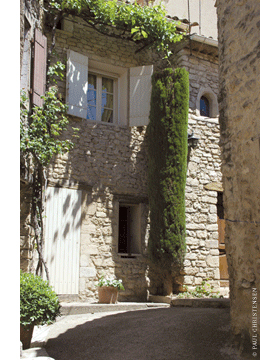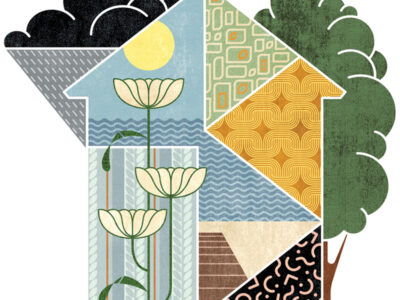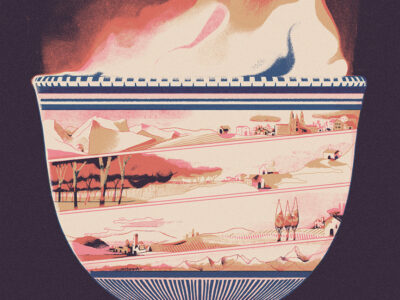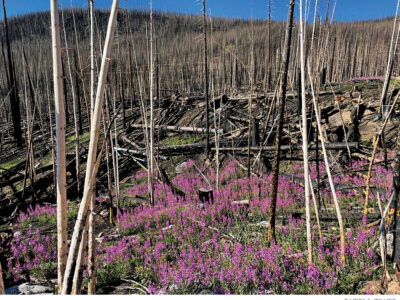
On buying a home in Provence, circa 1988.
By Paul Christensen
There are many books and pamphlets on how to buy a house in France. The process can be tricky and there are many ways to lose money or be lured into the wrong choice. Houses come on the market slowly, begrudgingly, after the heirs and relatives have had their court battles and resolved not to come to blows over its disposal. Sometimes even the gardener, entrusted for years with the upkeep of an empty house, may have a lien on its ownership, which you do not discover until you try to close the deal, or move.
Though Provence has its quaint face and meek manners, behind the comely appearances rage bitter feuds among the dwellers here. They stop short of murder (almost always) to win a suit against a neighbor’s transgressions.
I know an English woman, then married to a Frenchman, who bought a large house with property, but not the adjoining remise, the added portion that extended from the house on a lower terrace. This was bought by a Parisian couple who discovered they owned the little strip of ground running before the large, formal driveway into the house above. When my friend came down to the new co-owners to ask if she might purchase the strip of earth in front of her entrance, the answer was a flat, ill-humored no. To emphasize the point, shrubs were planted there by the Parisians and legal action threatened if anyone trod on them or budged them from the iron gates. To visit her now, one must find a little patch of weeds to park in and come through a side gate, narrow and inconspicuous behind the arched, formal entrance to the front. There the puny little privets struggle to root in the dust, and spread their branches with proprietary arrogance.
I wanted a house, I looked for one. I kept notes and learned the different areas where one might find one. My budget was meager, a small sum I had saved while teaching in Malaysia. It amounted to $40,000. It would buy no more than a porch or a shed or an apple tree with a scrap of roof under it. No matter. My wife and I looked in every little byway and village corner for my dream.
Our strategy was mainly to waste time and enjoy ourselves driving through hamlets and nearby villages, filling the car with smells of garlic, fennel, and cinnamon. Once, in the little cliff-top town of Saignon, we came into a square burbling with a large fountain. In one corner was a narrow house with a sale sign on it. The landlord was standing nearby and we were shown around inside. The rooms all faced the square and the narrow street; none looked beyond to the sunlight. The stairs were so dark we had to feel our way up to the next floor. The shutters were unbolted and a thin bluish haze came into the bedrooms. The odor of rotting wood stung our nostrils. By twisting painfully over the sill, you could see a sliver of the fountain, but it would take some personal risk to get a better view. Once, he explained, it had been a fine house, with the whole rear portion looking down on the coveted view of Apt and the villages beyond. At night, ooh la la, the lights, the sunsets! But alas, over the years, the previous owners (his own family) had sold off one room after another with any market value. Now there remained this apple core of darkness and crazy angles, of leaning walls and crooked tile floors. Downstairs, the only ventilated room opened onto the street. To have light at all, you were required to sit there, I suppose, in the full view of every passing villager.
Any chance of buying back a few of the other rooms? “Never,” he said, scraping his shoe with annoyance. That is the past. This, this tower of blue air and soft, crumbling wood was the future. I left the house to someone else’s dreams.
I was now an authority on the market for houses that came in at $80,000 to $90,000. I knew intimately what that included in the way of rooms, views, gardens, village locations. Shave a few dollars off and you found yourself in the dog patch end of the village; add a few and your upper windows looked over the neighbor’s fence into the spacious freedom of a valley. The French are masters at pricing an object; there were no accidents, no flukes, no bargains, no undiscovered diamonds.
The owner of a house in the dusty little town of Robion opened the door and led us into what seemed like the lobby of Dante’s Inferno. A short, blunt room went nowhere, not further into houseness, or space, but just there, a corridor that slammed you into solid rock. To the sides, like vents, low, narrow doors led off to other stumpy chambers, each crumbling and sad, and built, it seemed, for undressing the dead prior to heaving them into the pit.
There were other houses of a similar darkness and morbidity scattered throughout the villages. These were maisons du village, the townhouses of Provence, built primarily by farmers who had moved up in the world. Their habits and needs were different from anyone else’s. Peasant families preferred to live in tiny, well-heated parlors and to sleep in remote little rooms that would conceal their lovemaking, their children’s whimpers, and the dying of the elderly. They wanted no more sunlight than their eyes absorbed in a day’s plowing or planting. They chose to wall out the world of light which others worshipped at every sill.
It had been our privilege to find this peasant world intact before the renovators got to it. They were coming, and we were only a month or two ahead of their ladders and paint buckets. But here we were, creeping from vault to vault of a way of life that went back to the caves.
To find a house at our financial level meant taking the house directly from the peasant culture and making it minimally comfortable for middle-class habitation. So we left Apt, which was a dead end as far as buying houses, and headed east into no-man’s land, the undeveloped end of the valley. We drove along for 15 minutes or so, took a left up into the foothills of the Vaucluse Plateau, and wound around for a while until we came into a rain cloud and colder weather. It had been cool all day, but now there was sleet in the air, and a few snowflakes. We had climbed to about 1,500 feet of altitude, and in the distance were the sandy-colored walls of Saint Martin de Castillon. We stopped on the road and let a herd of goats pass by; the shepherd walked slowly ahead with his crozier, which he raised to show where to turn down into the fields. His cape was wool and was sodden with sleet. My heart almost broke for joy at the sight of the goats, their smell of dung and gamey milk. I loved it.
The houses in the bread-crust village were leaning this way and that as if whispering to one another. Nothing was gussied up. Even the shutters were bald and peeling, the walls left raw with patching concrete, the street asphalted and unglamorous as it bumped down through the center of town to a little bar at the far end. We drove along the peripheral road to the bar, interrupted a crowd of farmers having a morning marctogether, and got a key from the barkeep.
We pried open a big ugly door and went up the dusty tiled steps to a single room with a narrow window, a bar counter thrust up into the center of the room, nothing else but white walls, the bar, the floor littered with dust and bits of paper. It looked like the sad end of a bachelor’s dream, something he had run away from after touching bottom in his life.
We gave up on it, headed out, down to another house for which Bernadette, our agent, had a giant key. Bernadette was a rotund woman as tall as she was wide, but she moved gracefully on her tiny feet. The house stunk of mold and pesticide, and the walls were covered in a dead green mildew.
“Forget it,” I whispered to my wife. “Nice village, lousy houses.”
“There’s one more,” Bernadette said.
We followed meekly, our coats dusty with ice. We went down the Grand’Rue to a house that jutted out at an angle, just where the Impasse began. A tile stuck into the stonework announced the little blind-end as the Impasse de la Grand’Rue, a suitably dignified oxymoron, a good address for wanderers. We got the front door open, pushing and shoving it along the floor, and found ourselves in a long, triangular room full of tables, chairs, a wall thrust up arbitrarily under one of the beams. The ceiling was old, the real plank and plaster stretched over huge beams, two of them hand-hewn, the other two telephone poles. A fireplace trickled black rainy soot down the sides; a hole went through the floor to the right of the hearth, where cold air rushed up. It was a hay trap for feeding horses.
Both the bedroom and the bathroom had been left as if peasants had just gotten up for the day’s work. The mattresses were dented from sleep, the covers thrown over, the battered crate had an ashtray full of butts. The stairs led up to two other bedrooms, a grenier or hayloft running down the other side of the central wall, entered by a little door. The bedrooms were large, with windows over the Grand’Rue. Rain was running down the wall into a hole in the steps; it was cold inside, damp, dark, forgotten. I went to the living room again and looked at its miserable proportions, the hole in the floor, the floor tiles cresting slowly like a wave and descending at a slant to the front door. The floor was going.
Under the grenier was the remise, covered in straw and strung up with broken feeding troughs for sheep or goats. I dusted off my pants and went back to stand on the stairs, trying to imagine life in it. The rain was cold and flew off the step and sprinkled my face. The roof was probably rotten.
It was another dead end. I started to leave.
“Let’s take it,” I heard my wife say, her eyes bright with excitement.
“Take it? Take this heap of rubbish? This, this … this miserable cistern of a house?”
“Yes,” she said, and started framing things with her hands. “The wall would come down, we would have a big room then, and the kids would go in the upstairs back bedroom, your study would be at one end of the bedroom. O Paul, don’t you see? This is a great house!”
I couldn’t see, I didn’t believe, I thought she was teasing me. But she wasn’t. She meant every word of it.
On the way down to Apt we talked money. The house was part of a trust under the protection of the notary. It was available for 275,00 francs. “But I can talk to people, and get it for you for 200,000 clear,” Bernadette said.
At the time, that was $35,000. I liked the price, but it hardly mattered. There would be $40,000 to put into it to make it livable. I had forty altogether. Talk, talk, winding roads, talk and more talk, faster and sweeter talk until we got to rainy, darkening Apt.
The next day we felt the clutch of a decision gripping our bowels. Bernadette led me to a bank and we sat on the margins of a vast desk, talking rapidly to the loan officer, a thin, hollow-cheeked woman of 30 or so, tapping a new pencil on a new pad of paper. We got up finally, shook hands, and went out to the street.
We drove home in silence, the pit of our stomachs warm with fear. What have we done, we each thought in the rain, under the cold gray folds of the sky. Did we ever think it would be like this, buying a hole in the walls of Eden? It hurt, it dulled the nerves of the heart, it fell like lead pellets through the veins, it smarted behind the eyes, it squeezed the conscience to think most of our little nest egg would be cabled across the Atlantic and shrink like plastic on the hearth by the time the bank got through converting it. We were cooked, we were inked in, we were homeowners in Provence.
Paul Christensen Gr’75 lives in Provence and Texas, where he teaches modern literature at Texas A&M University. This essay was adapted from his recent memoir, Strangers in Paradise: A Memoir of Provence (Wings Press).




